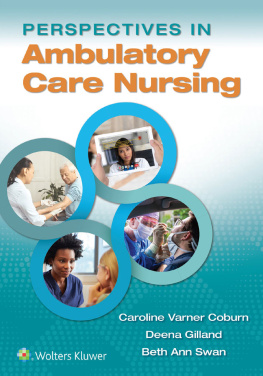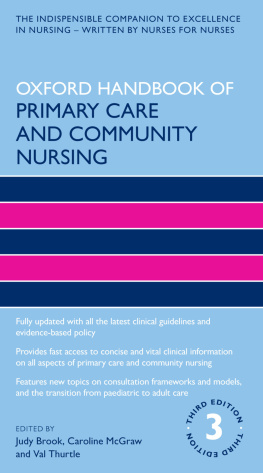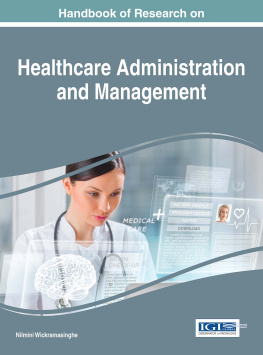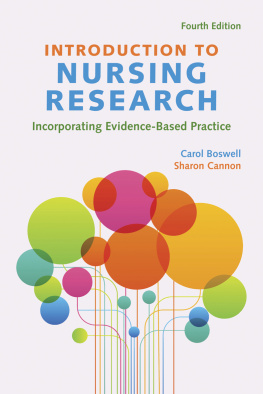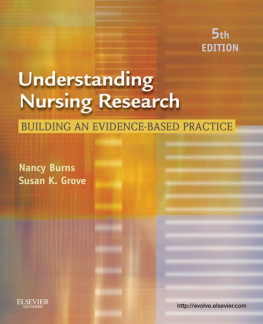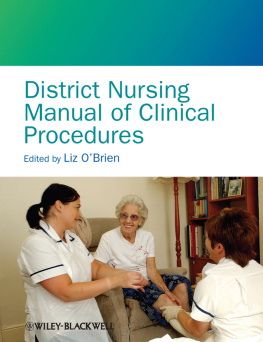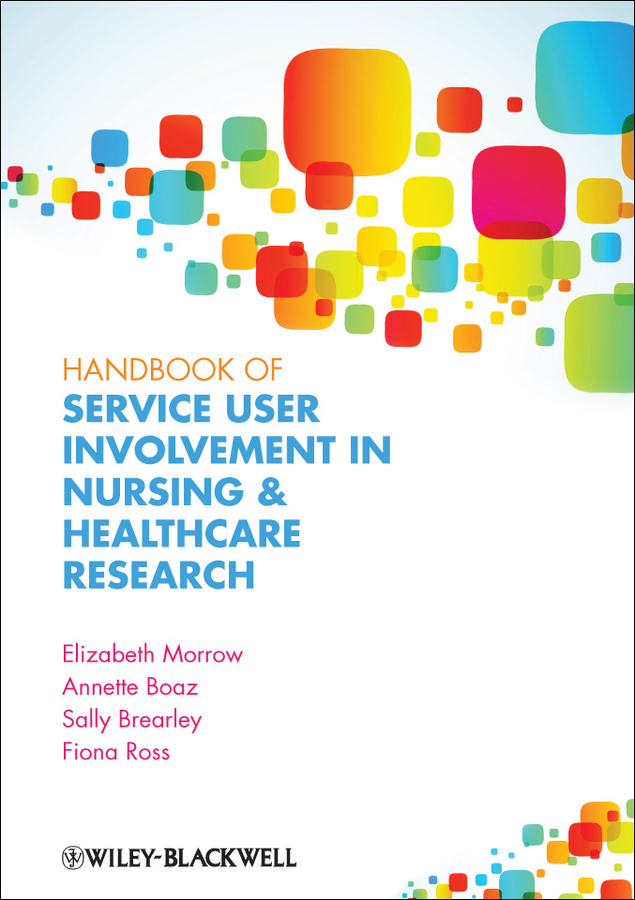
This edition first published 2012 2012 by Elizabeth Morrow, Annette Boaz, Sally Brearley and Fiona Ross
Wiley-Blackwell is an imprint of John Wiley & Sons, formed by the merger of Wileys global Scientific, Technical and Medical business with Blackwell Publishing.
Registered office
John Wiley & Sons, Ltd, The Atrium, Southern Gate, Chichester, West Sussex, PO19 8SQ, UK
Editorial offices
9600 Garsington Road, Oxford, OX4 2DQ, UK
The Atrium, Southern Gate, Chichester, West Sussex, PO19 8SQ, UK
111 River Street, Hoboken, NJ 07030-5774, USA
For details of our global editorial offices, for customer services and for information about how to apply for permission to reuse the copyright material in this book please see our website at www.wiley.com/wiley-blackwell.
The right of the author to be identified as the author of this work has been asserted in accordance with the UK Copyright, Designs and Patents Act 1988.
All rights reserved. No part of this publication may be reproduced, stored in a retrieval system, or transmitted, in any form or by any means, electronic, mechanical, photocopying, recording or otherwise, except as permitted by the UK Copyright, Designs and Patents Act 1988, without the prior permission of the publisher.
Designations used by companies to distinguish their products are often claimed as trademarks. All brand names and product names used in this book are trade names, service marks, trademarks or registered trademarks of their respective owners. The publisher is not associated with any product or vendor mentioned in this book. This publication is designed to provide accurate and authoritative information in regard to the subject matter covered. It is sold on the understanding that the publisher is not engaged in rendering professional services. If professional advice or other expert assistance is required, the services of a competent professional should be sought.
Library of Congress Cataloging-in-Publication Data
Handbook of service user involvement in nursing and healthcare research/Elizabeth Morrow [et al.].
p.; cm.
Includes bibliographical references and index.
ISBN-13: 978-1-4443-3472-2 (pbk. : alk. paper)
ISBN-10: 1-4443-3472-7 (pbk. : alk. paper)
1. NursingResearch. 2. Medical careResearch. 3. Medical personnel and patient.
I. Morrow, Elizabeth, 1975
[DNLM: 1. Nursing Research. 2. Health Services Research. 3. Patient Participation.
4. Professional-Patient Relations. WY 20.5]
RT81.5.H36 2012
610.73072dc23
2011015202
A catalogue record for this book is available from the British Library.
This book is published in the following electronic formats: ePDF 9781444347029; Wiley Online Library 9781444347050; ePub 9781444347036; Mobi 9781444347043
In memory of Ursula Hawgood, who worked with us, inspired us and involved us.
Contributors
The following people have kindly worked with us in the preparation of this book to share some of their experiences of service user involvement in research:
- Sophie Auckland, User Involvement Manager for Guys and St Thomas Foundation Trust and Kings College London Biomedical Research Centre explains her experiences of informing and advising academic and clinical research staff in a wide range of research areas including laboratory research, clinical trials and qualitative studies.
- Sheila Donovan, Research Fellow at the Faculty of Health and Social Care Sciences, Kingston University and St Georges University of London, explains some of the issues that can arise in relation to older service users views about payment.
- Jennifer Laws, a Researcher and Teaching Fellow at Durham University, provides an insight into managing diverse expectations whilst working with mental health service users to develop peer-support and advocacy services.
- Professor Colin Torrance, Dr Keith Weeks and Christine Wilson explain their views about embedding service user involvement in learning organisations. They are part of a research team at the University of Glamorgan, investigating the use of clinical simulation and virtual learning environments to educate healthcare professionals.
- Hazel Thornton, an Independent Advocate for Quality in Research and Healthcare, provides insights into service user involvement in clinical trials for breast cancer treatment.
- Sally Crowe, a consultant in Patient and Public Involvement, draws on her experiences of the practical and emotional aspects of involvement to provide advice about hearing the voices of those who are very sick.
- Dr Patricia Grocott, Reader Palliative Wound Care, Kings College London, and Elizabeth Pillay, Nurse Consultant, St Thomas Hospital London, explain how they are working in partnership with the charity DebRA UK to involve people with chronic and severe skin conditions in research.
- Jennifer Newman, Consumer Liaison Officer for the National Institute for Health Research Medicines for Children Research Network, explains her experiences of working to involve parents, carers, children and young people in the networks activities.
- Professor Jane Coad, based at Coventry University, explains some of her experiences of involving children and young people in the development of health services using participatory arts-based methods.
- Amy Feltham from YoungMinds provides a young persons view of VIK (Very Important Kid) panel and explains how getting the little things right helps make sure the big things run smoothly.
- Julie Wray, Researcher/Healthcare Professional/Survivor, explains her views on embracing the patient/carer voice and the importance of caring for the person not the illness.
- Christine Wilson explains how she has developed interactive methods a Living Library to help engage healthcare professionals and researchers in dialogue with people with mental health problems.
- The Sunderland family from Northumberland provide an insight into the research they did with their father before his death to mesothelioma in 2009.
- Nazira Visram, an experienced patient representative and Macmillan Trainer, discusses ideas for moving forward and sustaining collective service user efforts alongside contributing to experiential learning and self-management programmes for cancer care.
- Rory Byrne, based at the University of Manchester, gives a user-researchers perspective of mental health service user involvement.
- Professor Jane Coad describes a collaborative project with the childrens charity CLIC Sargent and some of the lessons learnt about how to evaluate young peoples experiences of involvement.
- Antje Lindenmeyer, Senior Research Fellow, Warwick Diabetes Care Research and Education User Group, explains her experiences of assessing the benefits of service user involvement with lay people who have an active interest in the experiences and care of people living with diabetes.
About the authors
Dr Elizabeth Morrow I started working in healthcare research in 1999 when I took up a Research Assistant post at the Faculty of Health and Social Care Sciences based at St Georges Hospital and jointly run by Kingston University. Before that I trained as a geologist and had briefly worked for the National Trust showing visitors around Cornish engine houses. In my new career, working under the direction of Professor Fiona Ross, I began to learn about research with people, the health system and something about professional cultures. Over the years I have worked on nursing research studies and service development projects and have enjoyed building relationships with a wide range of service users and their representative organisations. In 2003, I was lead researcher on the National Institute for Health Research Service Delivery and Organisation PIN project (Patient and public involvement in nursing, midwifery and health visiting research), led by Professor Ross. My doctoral thesis went on to look at the development of service user involvement in health research in the United Kingdom and Australia. My thesis argued that current knowledge and conceptualisations of service user involvement in health research tend to underplay the significance of external influencing factors such as established notions of what constitutes health research. The research I undertook showed that although tensions about professional power over service user involvement in health research cannot be escaped, they can be better understood by examining the reasons behind resistance and discomfort. These reasons may be entirely valid, but where there is uncertainty there is also the potential to develop new knowledge through language development, new epistemological stances, and subjective experiences and views. I now work as a Research Fellow for the National Nursing Research Unit based at Kings College London. My research interests include exploring the contribution that service users can, and should, make to contemporary healthcare policy and practice. With Annette Boaz, Sally Brearley and other colleagues I teach service user involvement in research at Kings College London.


